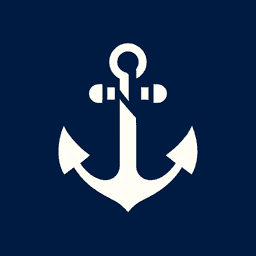
Deadweight Anchor: Definition, Uses, and Examples
January 16, 2025
Deadweight Anchor
A deadweight anchor is a type of anchor used in maritime applications, primarily for mooring purposes. Unlike traditional anchors that rely on flukes to dig into the seabed, a deadweight anchor relies on its own weight to provide holding power. This makes it particularly useful in situations where the seabed is rocky or otherwise unsuitable for other types of anchors.
Deadweight anchors are often used in temporary moorings, such as for buoys or floating docks, where ease of deployment and retrieval is important. They are also favored in areas where the seabed is too hard for other anchors to penetrate or where environmental regulations restrict seabed disturbance.
These anchors are typically made from dense materials like concrete or cast iron, ensuring they have sufficient mass to remain stable under tension. The design is simple, often consisting of a solid block with a central attachment point for the mooring line.
While deadweight anchors are effective in certain conditions, they are generally not suitable for use in areas with strong currents or where the anchor needs to be repositioned frequently, as their holding power is directly related to their weight and the friction between the anchor and the seabed.
In summary, deadweight anchors are a practical solution for specific maritime mooring needs, offering reliability in challenging seabed conditions while minimizing environmental impact.
Understanding Deadweight Anchors
Deadweight anchors are a type of anchor used primarily in maritime applications to secure vessels in place. Unlike traditional anchors that rely on flukes to dig into the seabed, deadweight anchors use their own weight to provide stability and hold.
How Does a Deadweight Anchor Work?
Deadweight anchors function by utilizing their mass to resist movement. They are typically used in situations where the seabed is rocky or unsuitable for other types of anchors. The sheer weight of the anchor ensures that it remains stationary, providing a reliable mooring solution.
Advantages of Using Deadweight Anchors
- Simplicity: With no moving parts, deadweight anchors are straightforward to deploy and retrieve.
- Versatility: Suitable for a variety of seabed conditions, especially where traditional anchors may fail.
- Reliability: Their weight provides a consistent holding power, making them ideal for long-term mooring.
Common Questions About Deadweight Anchors
What are the typical materials used for deadweight anchors?
Deadweight anchors are often made from dense materials such as concrete, steel, or iron to maximize their weight and effectiveness.
In what scenarios are deadweight anchors most effective?
These anchors are most effective in areas with rocky or hard seabeds where traditional anchors cannot penetrate. They are also used in temporary mooring situations or where environmental conditions are unpredictable.
How do you determine the appropriate size of a deadweight anchor?
The size of a deadweight anchor is determined by the size and type of the vessel, as well as the environmental conditions of the mooring location. Consulting with maritime experts or using anchor sizing charts can help in selecting the right anchor.
What is the meaning of heavy weight anchor?
A heavy weight anchor is a large, heavy object, typically made of metal, that is attached to a boat by a rope or chain. When dropped into the water, it rests on the bottom and prevents the boat from moving, similar to a deadweight anchor.
What is deadweight in maritime terms?
In maritime terms, deadweight refers to the total weight a ship can safely carry, including cargo, fuel, passengers, and crew. It is a measure of a ship's carrying capacity.
What are the different types of anchors in ships?
There are several types of anchors used in ships, including Admiralty Pattern, CQR, Danforth, Rochna, Stockless, and Grapnel. Each type is designed for specific conditions and purposes, making it important to choose the right anchor for the job.




